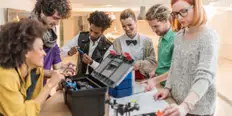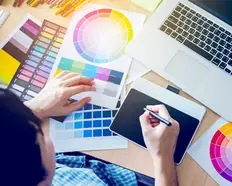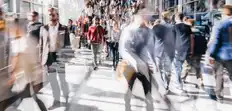Chat with Ava - Your AI Business Consultant
Hi I'm Ava, your AI guide to supercharging your business!
Whether you're already running a business or dreaming of starting one, I'm here to help turn your vision into reality using AI powered freelancers. Share your business goals, and together, we'll create a project that our talented freelancers can bid on. Let's make your vision a reality!
I have a business
I'm starting a business
Something went wrong while sending the conversation to your email. Please try again later.
You can only save your conversation once per hour. Please try again later.
Your conversation is too short. Keep chatting with Ava to enable saving.
Discovering Talented Fashion Designers Near You for Projects
Fashion lovers, find out the nearest fashion designers to you and never miss out on the latest trends again!
Apr 13, 2023 • 17 minute read
Updated on Apr 26, 2023 by Hector P.

Digital Marketer | 10+ years experience
Copy to clipboard failed, please try again after adjusting your permissions.
Copied to clipboard.

Hey there, fellow fashion enthusiast! If you're searching for "Fashion Designers Near Me," you've come to the perfect spot. Whether you're on the hunt for unique pieces for your wardrobe, looking to collaborate on a project, or desiring some styling advice, finding a Fashion Design expert close to home can be an amazing experience.
With the plethora of talented Fashion Designers out there, it's no wonder you're eager to explore your options. But how can you find the best fit for your needs? We're here to help you embark on this exciting journey!
For starters, it's essential to consider the type of fashion designer you want to work with. Are you looking for someone with a specific design niche, like sustainable fashion or bridal wear? Or do you have broader interests and want to explore a variety of styles? Understanding your preferences will help narrow down your search and lead you to the perfect match.
One fantastic way to discover local talent is by attending local fashion events and networking with industry professionals. Keep an eye out for fashion shows, pop-up shops featuring local designers, and workshops where these creative minds come together. These events not only showcase amazing design work but also provide opportunities to connect with designers in person.
Social media platforms are another great avenue for finding designers near you. Instagram, in particular, has become a hub for showcasing fashion design portfolios. Simply search for relevant hashtags related to your city or region and get ready to be wowed by stunning designs crafted by local creatives.
In addition to these in-person and virtual methods, don't forget about good ol' word-of-mouth recommendations! Reach out to fellow fashion-savvy friends or family members and ask if they know of any talented designers in the area. You might be surprised by the incredible connections you can make through your existing network.
If all else fails, conducting a simple search on Google for "Fashion Designer" within your town or city should yield a range of options for you to explore. Make sure to read testimonials and reviews from former clients, as these provide invaluable insight into the designer's creative process and professionalism.
In conclusion, finding an exceptional fashion designer near you can be an exhilarating and rewarding experience. By utilizing local resources, networking events, social media platforms, and personal recommendations, you'll be able to discover the incredible talent your community has to offer. We wish you the best of luck on your fashion-forward journey!
Definition of Fashion Design
Picture this: you're walking in a quaint little city wearing your favorite outfit when suddenly, a stranger compliments your style. You might think to yourself, "Why do I feel so amazing in this attire?" Well, that's the beauty of fashion design! In simple terms, fashion design is the creative process of conceptualizing, planning, and producing garments, accessories, and footwear to be worn by individuals. It's a form of self-expression that combines visual appeal with functionality, making us look and feel fabulous.
Fashion design isn't just about sketching pretty dresses or trendy outfits on paper. It encompasses every aspect of the clothing industry, from conceptualization to final creation. This means understanding fabric types, patterns, cuts, color palettes, and construction techniques—all of which are essential elements in bringing fashionable ideas to life.
When it comes to fashion design specialties, the sky's the limit! Some designers focus on haute couture—the glamorous world of high-end fashion—while others delve into everyday wear or specialize in specific areas such as athletic wear, swimwear, bridal gowns, or accessories. Each designer has their unique vision and approach to creating beautiful works of wearable art that represent their personal aesthetic.
The origin story for many designs comes from something known as a "mood board." A mood board can include inspirational imagery and color schemes to create a theme for an upcoming collection. This serves as a visual roadmap that guides designers through their creative process as they draw inspiration from various sources like culture, history, nature or even emotions to create articles of clothing tailored for a certain audience or purpose.
Beyond creativity and artistic ability lies the business aspect of fashion design—a crucial component in ensuring success within this competitive industry. Designers must possess a strong understanding of marketing, branding, and consumer behavior to maximize their reach and effectively sell their product.
So next time you're rocking that outfit that turns heads, remember the intricate process behind that fabulous piece of clothing crafted by a talented designer. It's truly an art form that combines innovation, passion, and skill to bring beautiful designs to life.
Who are Fashion Designers?
Fashion designers, as we all may have heard at some point, are the brains behind the beautiful and trendy garments, accessories, and footwear that you adore. They are immensely creative individuals with a knack for understanding and predicting the ever-changing fashion industry. They blend artistic skills, knowledge of fabric properties, color sense, pattern making, and marketing to bring their ideas into tangible clothing pieces that inspire awe and admiration.
These talents come in varying levels of experience and expertise. Some have graduated from prestigious fashion schools and honed their abilities under the guidance of industry giants; others are self-taught individuals who fell in love with designing clothes, inspired by their passion for art and personal expression. And then there are those who fall somewhere in between – innovative minds with a unique blend of formal training and self-directed learning that propels them into creating extraordinary designs.
The fascinating world of fashion design is also not limited to designers who create high-end luxury garments for the runway or celebrities. There's a vast spectrum of designers catering to various niche markets like sportswear, streetwear, bridal wear, children's clothing, plus-size clothing, swimwear, and many more! The diversity in talents makes it easier for everyone to find a designer whose vision aligns with their personal style or wardrobe aspirations perfectly.
Another interesting aspect is that not all fashion designers necessarily work in mainstream companies or own extravagant boutiques. The rise of digital platforms has led to an increasing number of talented designers turning freelance or setting up their design agencies! These design wizards provide their expertise on demand while retaining creative freedom – allowing clients to benefit from a personalized design experience that meets their unique needs.
Regardless of how they choose to work or showcase their talent, one thing remains true for all fashion designers – they play an essential role in our lives, transforming how we dress ourselves and helping us embrace our personality through the clothes we wear. So next time you put on your favorite garment or accessory, remember the hard work, passion, and skill that went into its creation by a fashion designer!
How to Engage a Fashion Designer?
Looking fabulous is a dream that everyone wants to achieve, and for that, engaging with the right fashion designer is crucial. So, how do you find the perfect one amidst the ocean of talented designers out there? Here are some useful tips to help you engage just the right professional for your sartorial needs.
First and foremost, begin by identifying your style preference and specific requirements. Are you looking for someone creative to design your wedding gown, or do you need a designer with expertise in eco-friendly materials? Knowing precisely what you want will help narrow down the list of potential designers and ensure that they possess the necessary skillset for your project.
Once you have a clearer vision of what you need, start researching various designers. Look into their portfolio, past work experience, and customer reviews. This information will provide valuable insights into their style and capability to execute your vision. Make a shortlist of designers who have demonstrated expertise in areas relevant to your requirements.
Next, start establishing a rapport with potential designers by communicating your ideas and expectations clearly. Provide them with ample visual references and discuss budgets, timelines, and deliverables candidly. It's essential to have open communication channels from the very beginning to prevent any misunderstandings further down the line.
In addition, don't be shy about asking questions such as who their favorite clients are or how they handle stressful situations. Their answers will offer glimpses into their work ethic, adaptability, and compatibility with your personality.
Another aspect worth considering is whether you prefer working with local talent or are open to remote collaborations. Assess the pros and cons carefully as working remotely might offer access to a broader pool of talent but may have its logistical challenges in terms of communication and coordination.
Lastly, remember that choosing the right designer is not just about their track record or skill set. It's also crucial that they share your vision and enthusiasm for the project. They should be able to understand and respect your style preferences while guiding you with their expertise.
Engaging a fashion designer is an exciting journey, and following these practical steps will help you make an informed decision to find a fantastic collaborator. Good luck!
Cost of Fashion Design by a Fashion Designer
When planning to engage a fashion designer for your upcoming projects, it is essential to consider the cost involved in hiring their services. Just like any other creative profession, fashion designers charge a wide range of prices, and it can be overwhelming to figure out how much should be allocated for this crucial aspect of your business or personal needs. In this article, we will provide you with necessary information on the various factors that affect the cost of fashion design by a professional designer and help you find the right fit for your budget.
Experience and expertise are two significant determinants when it comes to the cost of hiring a fashion designer. A designer with an established successful portfolio is likely to charge a premium for their services compared to an up-and-coming talent. A higher price does not necessarily guarantee better results; therefore, it's crucial to strike the right balance between cost and creative talent.
Another vital factor influencing the price is the scope and complexity of the project. If you require an intricate and detailed design with multiple components, this may impact the cost, as it will demand more time and effort from the designer. On the other hand, if your project is simple and straightforward, fewer hours may be needed to accomplish it, which might result in lower costs.
The location of your designer can also affect their pricing. Local designers might have higher overhead costs due to rent, utilities, operating expenses, and may need to pass these costs onto their clients. Remote designers might have lower overhead expenses; however, they may also demand higher fees due to their international experience or specialized skillsets.
Lastly, how quickly you need your designs will impact cost considerations. Requiring a swift turnaround time may lead some designers to charge additional fees for prioritizing your project over others. The saying "you get what you pay for" applies here; but, do not assume that paying top dollar automatically ensures the best outcome.
In conclusion, understanding the various factors that affect the cost of hiring a fashion designer is essential in finding the right service provider for your project. Be sure to thoroughly research and compare different designers to ensure you're making the right choice based on your requirements and budget. And remember, sometimes it's worth investing a bit more in a talented individual or team to guarantee outstanding results and long-lasting professional relationships.
Deliverables from a Fashion Designer: What to Expect
So, you've found the perfect fashion designer, and you're excited to see what they can create for you. But what exactly are the deliverables that you should expect from your designer? This article is your guide to understanding the end-products typically provided by a fashion designer in different aspects of their work, ensuring that you get what you want and need for your project.
First and foremost, one of the primary deliverables from your fashion designer will be sketches and illustrations that capture their vision for your project or collection. These visual representations will help both of you better communicate with each other about the desired look and feel of the final pieces. High-quality sketches are essential for outlining the overall style, color schemes, patterns, fabrics, and silhouettes. Once they're approved, these sketches serve as a reference for patterns to be created accordingly.
Next up comes technical drawings or fashion flats. Unlike artistic fashion illustrations, these are precise, detailed depictions of your garment that focus on its structure and construction. These drawings generally include measurements and specifications which seamstresses and manufacturers will use when creating the physical garment. Accurate technical drawings ensure that everyone involved in the production process understands how each piece should be made.
Another critical element a fashion designer will provide is the mood board—a visual tool that captures the essence of an overall collection or project's aesthetic direction. A mood board typically contains images, materials swatches, colors, inspirational photographs, typography samples or any other item which conveys theme ideas clearly. This powerful communication tool helps keep all team members on track throughout the project.
Fabric selection is another key deliverable from a fashion designer. They will choose the perfect material suited for each garment or accessory in terms of weight, drape, texture, and print. Additionally, a talented fashion designer will guide you on sourcing eco-friendly and sustainable fabrics, keeping in mind the trend and the environment.
Ultimately, it is essential to clarify the expected deliverables from your fashion designer before commencing any project. This sets clear expectations from both sides and allows for a smoother process. Remember, the more specific you are about your needs and requirements upfront, the better your designer will be able to meet and even exceed those expectations!
Working Remotely with a Fashion Designer
In today's modern and fast-paced world, collaborations and partnerships have become more versatile than ever before. Working remotely with a fashion designer is one way to reap the benefits of such flexibility. With the help of technology and better communication methods, designers and clients can collaborate without being physically present in the same place. Let's explore how to effectively work remotely with a talented fashion designer.
First and foremost, it's vital to establish clear communication channels between you and your chosen fashion designer. There are various platforms both parties can utilize, such as email, video calls, project management tools, and instant messaging apps. The key is to find a medium that works best for both of you to ensure regular updates and progress reports are shared seamlessly.
When working remotely with a fashion designer, it's essential to have a style guide or mood board detailing your vision for the clothing line or project. This will allow the designer to have a clear understanding of your creative direction from the outset. With this guideline in place, the designer can create sketches that align with your expectations without having to go back and forth extensively.
Trust plays an essential role when collaborating from a distance. As partners in this creative endeavor, both parties should trust each other's skills and expertise. Setting milestones and deadlines for each phase of the project will help keep the work process smooth and organized.
One major benefit of working remotely with a fashion designer is having access to a larger pool of skilled professionals across the globe. This enables you to select the most suitable talent for your project without being limited by geographic location. Moreover, remote collaborations are often more budget-friendly as they do not involve cost overheads such as rent for an office space or travel expenses.
In conclusion, working remotely with a fashion designer can be an advantageous and cost-effective way of bringing your vision to life. The key components for a successful remote collaboration involve effective communication, setting clear expectations, establishing trust, and staying organized. Embrace the benefits of remote work and harness the creativity of talented fashion designers from around the world.
Pros and Cons of Local vs. Remote Fashion Designers
In today's interconnected world, the barriers to finding and working with talented fashion designers have been significantly lowered. As a result, hiring a local or remote fashion designer has become an important consideration for businesses and individuals alike. In this article, we'll discuss the pros and cons of working with local vs. remote fashion designers to help you make an informed decision.
One of the main benefits of working with a local fashion designer is the ease of communication and collaboration. Face-to-face interactions allow for better understanding of project requirements and help in building strong partnerships. Additionally, local designers are more familiar with the trends, styles, and preferences of the target market, which can prove advantageous in designing outfits that appeal to specific demographics.
However, there are some drawbacks to consider when hiring a local fashion designer. Depending on your location, there may be limited options for designers with the required experience and skill set. Moreover, the higher cost of living may result in increased design fees.
Working with remote fashion designers allows you access to a global pool of creative talent. This means you can find the perfect fit for your design needs regardless of their location in the world! Moreover, since freelancers often have lower overhead costs, hiring a remote designer may prove more cost-effective compared to a local one.
However, communication challenges can arise when collaborating with remote designers due to differences in time zones, language barriers, or cultural nuances. Additionally, it might be difficult to establish trust without face-to-face interactions.
There is no one-size-fits-all answer when it comes to choosing between a local or remote fashion designer. Ultimately, your choice will depend on factors such as your budget, project requirements, and personal preferences for communication and collaboration.
One approach you can take is to experiment with both local and remote designers for smaller projects before deciding which route to pursue for larger, more significant endeavors. Whichever option you choose, it's essential to maintain clear communication channels and establish expectations from the beginning to ensure a successful collaboration and fantastic final product!
Freelance vs. Agency Fashion Designers: The Pros and Cons
Having the right fashion designer is crucial to a brand's success. While choosing between a freelancer and an agency can be tough, it's important to closely consider the pros and cons of each to make the right decision. Don't worry! We're here to help you navigate your options in a way that makes you as happy as a clam at high water!
First, let's take a sneak peek at
freelance fashion designers
Now, onto the not-so-great aspects of freelance fashion designers: just like a box of chocolates, you never know what you're going to get! In other words, it can occasionally be a bit tougher to ensure consistency and reliability when working with freelancers. They might also lack access to some of the resources that agencies have at their disposal.
Moving on to
agency fashion designers
However, those benefits sometimes come with higher price tags (we're talking Prada levels). Also, because they cater to multiple clients, their schedules can be less flexible than the average freelancer. This could affect the level of attention they can provide your brand.
To wrap things up, it's all about discovering what works best for you and your brand. When weighing up the pros and cons of freelance and agency fashion designers, consider the resources available, your budget, as well as your desired level of communication and flexibility. May your fashion design journey be filled with creativity and success!
Recap of Key Points to Keep in Mind While Engaging a Fashion Designer
So, you've decided to engage a fashion designer for your next project. Whether it's for a personal wardrobe update, a runway show or a new retail collection, working with the right professional can make all the difference. In this article, we'll recap key points and discuss some essential considerations when selecting and partnering with a fashion designer to help ensure success and satisfaction from start to finish.
Firstly, it's crucial to identify the right fit for your specific needs. To select an ideal fashion designer, consider factors such as their style, portfolio, experience and reputation. Look for someone whose aesthetic complements your vision, demonstrates a strong ability to execute through their past work and comes highly recommended from previous clients.
It's important to have a clear understanding of the costs associated with engaging a fashion designer before moving forward. This includes their design fees, any additional expenses related to the production process (e.g., materials) as well as any extra services that may be required (think styling sessions). Be sure to discuss payment terms upfront and include them in your agreement.
Setting expectations about deliverables early on is essential for a smooth collaboration. Both parties should agree on what will be provided throughout the engagement - this could include items such as initial sketches, digital renderings or physical samples. Establishing milestone deadlines can help keep everyone on track and successfully manage timeframes.
Consider how you prefer to work with your fashion designer – remotely or locally. Both options have their pros and cons; so ultimately it will come down to aspects like communication preferences, location constraints and availability of local talent that will drive your choice. Similarly, you'll also need to decide whether hiring a freelance designer or partnering with an agency better suits your needs based on factors such as budget, flexibility and project scope.
In conclusion, keeping these key points in mind while engaging a fashion designer will help ensure a smoother collaboration process and ultimately lead to more successful outcomes. No matter your choice in designer or working style, the most important thing is to foster open communication and trust throughout the journey.
Final Thoughts and Recommendations on Engaging a Fashion Designer
As we have explored throughout this blog, engaging a professional fashion designer can be a wonderful experience, whether you're an individual looking to create your dream outfit or a business seeking fresh and innovative designs. Here are some final thoughts and recommendations to keep in mind before hiring a fashion designer:
1. Thorough research:
2. Communication:
3. Patience and flexibility:
4. Budgeting:
5. Long-term investment:
Thus, whether you're considering local or remote designers, the bottom line is to find the right professional whose vision aligns with your unique needs. The right designer can elevate your project to new heights, so use these recommendations as a guide to navigating the process confidently and successfully.
Hire an Expert Fashion Designer on Freelancer.com
Finding the perfect fashion designer to bring your vision to life can be time-consuming and challenging. Whether you're starting a new clothing line or just looking for a skilled expert to create a bespoke piece for a special occasion, hiring an expert fashion designer is crucial. In today's digital world, platforms like Freelancer.com have made sourcing top talent much more accessible.
Freelancer.com is a global platform that connects business owners and individuals with an extensive pool of talented freelance and agency designers. The website's features make finding, managing, and collaborating with expert fashion designers seamless and efficient.
With thousands of professionals available at your fingertips, finding the right candidate is easy. You can browse through portfolios and compare reviews from previous clients to narrow down your choices. Once you've shortlisted designers that fit your requirements, you can message them directly and discuss the specifics of your project. This way, you can gauge their understanding of your needs and evaluate how well they communicate.
One of the significant advantages of using Freelancer.com is the platform's focus on secure payment gateways. The platform allows you to create milestones for your project, which ensures that payment occurs only when you approve completed work. This feature keeps both parties accountable throughout the collaboration process.
Another benefit of using Freelancer.com is its integrated management tools. Sharing files, tracking project progress, and providing feedback are all easily managed through the platform's interface. Should any issues arise during your collaboration with a designer on Freelancer.com, their support team is available around the clock to help resolve disputes fairly.
In conclusion, hiring an expert fashion designer through Freelancer.com represents the perfect solution for anyone seeking top-quality design services without the constraints of location or budget. By leveraging this innovative platform, you can greatly simplify the process of finding, vetting, and collaborating with creative designers who can bring your fashion ideas to life.
Tell us what you need done
Enter your project name
Related Stories
Talk to one of our Technical Co-Pilots to help with your project
Recommended Articles Just for You

Finding the right freelance graphic designer for your project can be easy if you know the right questions to ask and the skills to look for.
5 min read
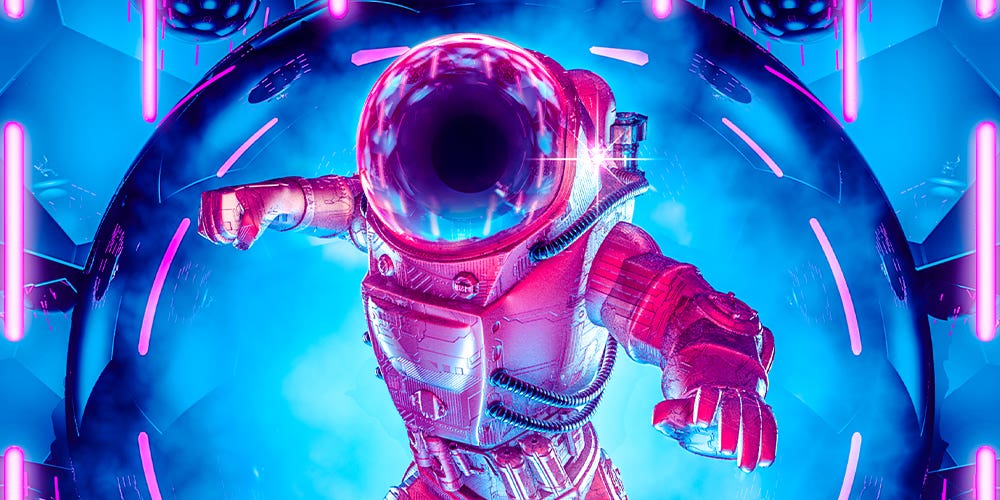
Great graphic design will solidify your brand identity and drive revenue. Find out how to hire a great designer and what you should expect to pay.
9 min read
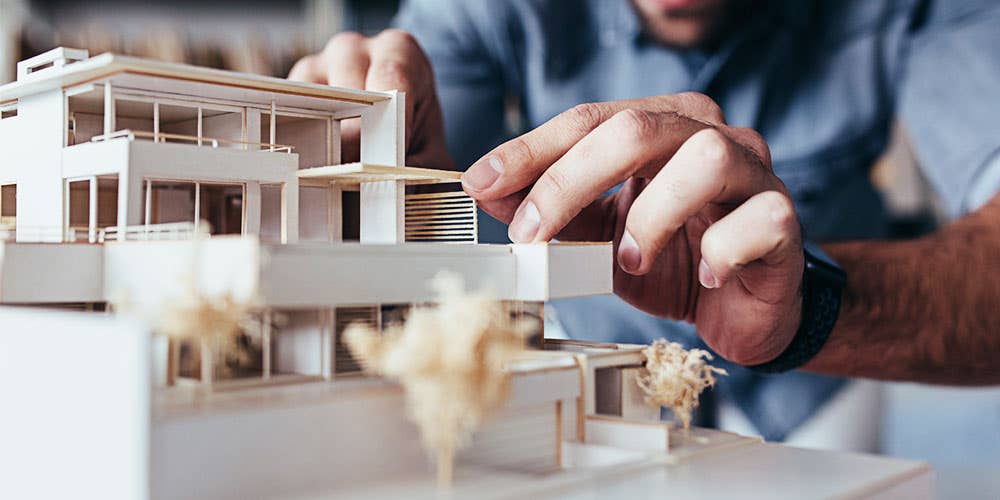
Interior design seems like a task that requires face-to-face contact, but technology is quickly changing the way interior designers can work
8 min read
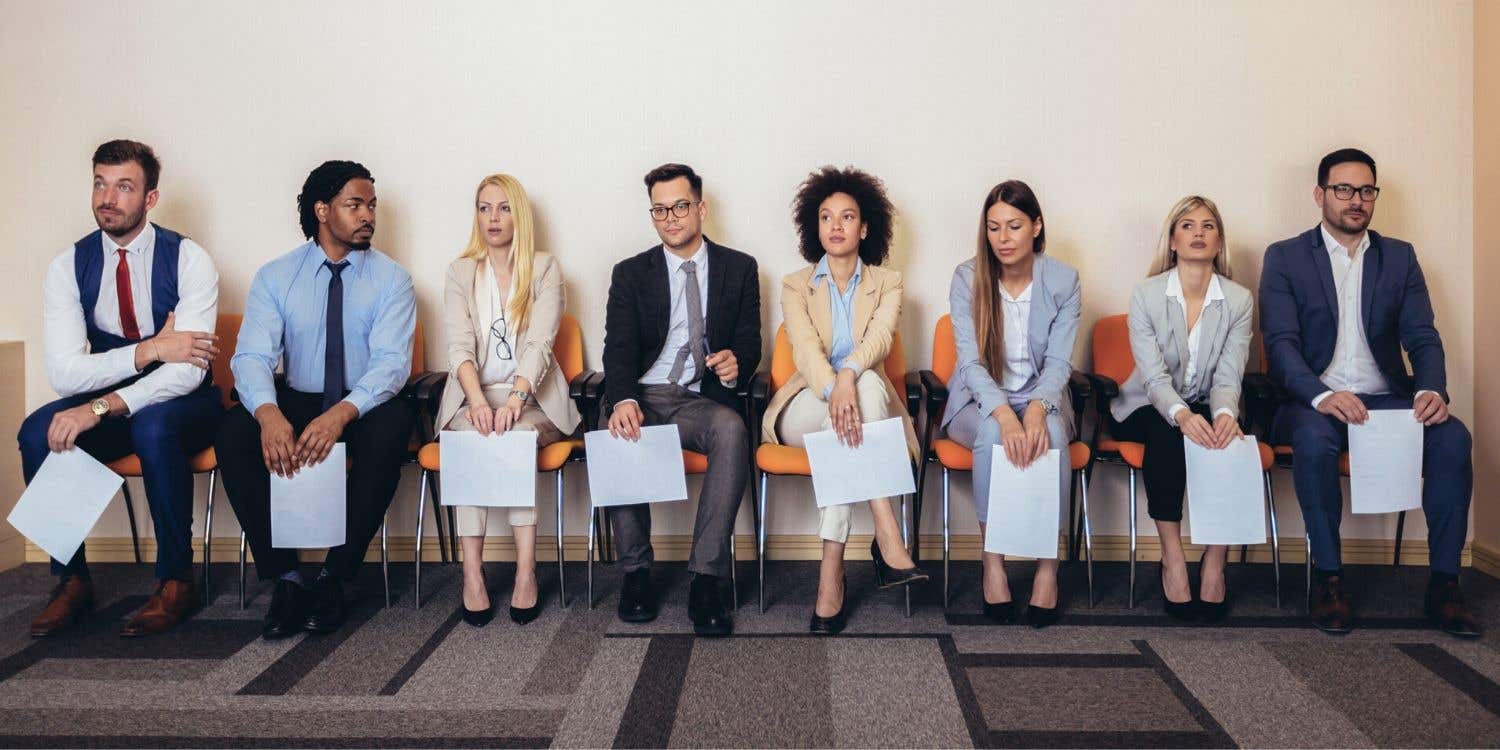
So you've posted your project on Freelancer and the bids are rolling in. What happens next? We'll show you how to pick the perfect freelancer
6 min read
Thanks! We’ve emailed you a link to claim your free credit.
Something went wrong while sending your email. Please try again.
Loading preview
Permission granted for Geolocation.
Your login session has expired and you have been logged out. Please log in again.
